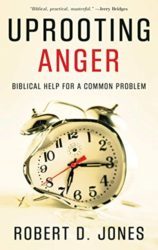Uprooting Anger
Do you struggle with anger, either in yourself or with others? Robert Jones has written an excellent book, Uprooting Anger: Biblical Help for a Common Problem, on anger that you might want to read if you struggle in this area.
In this book, he gives three fundamental principles to try to identify whether you have an anger problem and whether your anger is righteous or not. We all experience anger and express it in different ways. The mature believer, though, must make sure his anger is not violating Scripture. In James 1:19-20![]() we are reminded of the following: “Everyone should be quick to listen, slow to speak and slow to become angry, for man’s anger does not bring about the righteous life that God desires.” So how do we do that? How do we differentiate between sinful anger and righteous anger?
we are reminded of the following: “Everyone should be quick to listen, slow to speak and slow to become angry, for man’s anger does not bring about the righteous life that God desires.” So how do we do that? How do we differentiate between sinful anger and righteous anger?
The first principle is, “It reacts against actual sin (as biblically defined).” Is there a biblical standard, an objective standard that has been broken here? Can you point to the teaching of Scripture to show that what angers you also angers God? Is Scripture clear on the issue?
Secondly, to determine whether your anger is right or not ask yourself the following question—What’s your motive? Righteous anger “focuses on God and His concerns (not me and my concerns).” Are you angry because you are offended or because God is offended? There are times I get angry over some standard I believe is broken. The challenge though is whether it is mine or God’s. “They’re not showing me respect.” You’re not showing me love” “ You’re not treating me the right way.” See how the standard has become me—it’s all about me. We motivate my anger. When your anger is driven by yourself, your interests or your self-promotion, you are not on safe ground. If you could find a biblical standard, but not a biblical motive, then you must reevaluate your anger. The next element is what is motivating the anger. Whose standard has been broken? Yours or God’s?
The third principle is that righteous anger “coexists with other godly qualities and expresses itself in godly ways.” This last criterion is focused on how you display your anger. Do you show Christlike character in your anger? See, it’s one thing to be angry over something. It’s another thing to say I’m doing it for God’s glory and others’ good. But now if I attack you, and I become sinful in the way I’m acting, my righteous anger has now become sinful anger.
To be sure you are handling your anger in a God-honoring way take counsel with yourself. See, most of us react, right? We get angry. We react. Some of us overreact. We get defensive and or overly emotional. We let our emotions drive us. We lose control. We get impulsive, and say, “Okay, do you know what? Even though I acted in this way, it was because you did this to me.” We blame somebody else, right? We react.
What God requires of us is to respond in God-honoring ways, to be thoughtful, reasonable, responsible, and not to lose control, but to gain control. When you do that, you’re going to listen. You’re going to learn. What God is going to do through you is to help you confront people in God-honoring ways. You will be abiding by the wisdom found in Proverbs 29:11![]() “A fool gives full vent to his anger, but a wise man keeps himself under control.”
“A fool gives full vent to his anger, but a wise man keeps himself under control.”



